- Home
- Paolo Bacigalupi
Windup Stories Page 3
Windup Stories Read online
Page 3
He had fantasized that he would smuggle Gita back across the shining sea, and bring her close to the accountants who calculated calorie burn quotas for the world. Close to the calories, as she had said, once so long ago. Close to the men who balanced price stability against margins of error and protectively managed energy markets against a flood of food. Close to those small gods with more power than Kali to destroy the world.
But she was dead by now, whether through starvation or disease, and he was sure of it.
And wasn’t that why Shriram had come to him? Shriram who knew more of his history than any other. Shriram, who had found him after he arrived in New Orleans, and known him for a fellow countryman: not just another Indian long settled in America, but one who still spoke the dialects of desert villages and who still remembered their country as it had existed before genehack weevil, leafcurl, and root rust. Shriram, who had shared a place on the floor while they both worked the winding sheds for calories and nothing else, and were grateful for it, as though they were nothing but genehacks themselves.
Of course Shriram had known what to say to send him upriver. Shriram had known how much he wished to balance the unbalanceable.
They followed Bowman down empty streets and up remnant alleys, winding through the pathetic collapse of termite-ridden wood, crumbling concrete foundations, and rusted rebar too useless to scavenge and too stubborn to erode. Finally, the old man squeezed them between the stripped hulks of a pair of rusted automobiles. On the far side, Lalji and Creo gasped.
Sunflowers waved over their heads. A jungle of broad squash leaves hugged their knees. Dry corn stalks rattled in the wind. Bowman looked back at their surprise, and his smile, so hesitant and testing at first, broadened with unrestrained pleasure. He laughed and waved them onward, floundering through a garden of flowers and weeds and produce, catching his torn hemp cloth on the dried stems of cabbage gone to seed and the cling of cantaloupe vines. Creo and Lalji picked their way through the tangle, wending around purple lengths of eggplants, red orb tomatoes, and dangling orange ornament chilies. Bees buzzed heavily between the sunflowers, burdened with saddlebags of pollen.
Lalji paused in the overgrowth and called after Bowman. “These plants. They are not engineered?”
Bowman paused and came thrashing back, wiping sweat and vegetal debris off his face, grinning. “Well, engineered, that is a matter of definition, but no, these are not owned by calorie companies. Some of them are even heirloom.” He grinned again. “Or close enough.”
“How do they survive?”
“Oh, that.” He reached down and yanked up a tomato. “Nippon genehack weevils, or curl.111.b, or perhaps cibiscosis bacterium, something like that?” He bit into the tomato and let the juice run down his gray bristled chin. “There isn’t another heirloom planting within hundreds of miles. This is an island in an ocean of SoyPRO and HiGro. It makes a formidable barrier.” He studied the garden thoughtfully, took another bite of tomato. “Now that you have come, of course, only a few of these plants will survive.” He nodded at Lalji and Creo. “You will be carrying some infection or another and many of these rarities can only survive in isolation.” He plucked another tomato and handed it to Lalji. “Try it.”
Lalji studied its gleaming red skin. He bit into it and tasted sweetness and acid. Grinning, he offered it to Creo, who took a bite and made a face of disgust. “I’ll stick with SoyPRO.” He handed it back to Lalji, who finished it greedily.
Bowman smiled at Lalji’s hunger. “You’re old enough to remember, I think, what food used to be. You can take as much of this as you like, before we go. It will all die anyway.” He turned and thrashed again through the garden overgrowth, shoving aside dry corn stalks with crackling authoritative sweeps of his arms.
Beyond the garden a house lay collapsed, leaning as though it had been toppled by a megodont, its walls rammed and buckled. The collapsed roof had an ungainly slant, and at one end, a pool of water lay cool and deep, rippled with water skippers. Scavenged gutter had been laid to sluice rainwater from the roof into the pond.
Bowman slipped around the pool’s edge and disappeared down a series of crumbled cellar steps. By the time Lalji and Creo followed him down, he had wound a handlight and its dim bulb was spattering the cellar with illumination as its spring ran its course. He cranked the light again while he searched around, then struck a match and lit a lantern. The wick burned high on vegetable oil.
Lalji studied the cellar. It was sparse and damp. A pair of pallets lay on the broken concrete floor. A computer was tucked against a corner, its mahogany case and tiny screen gleaming, its treadle worn with use. An unruly kitchen was shoved against a wall with jars of grains arrayed on pantry shelves and bags of produce hanging from the ceiling to defend against rodents.
The man pointed to a sack on the ground. “There, my luggage.”
“What about the computer?” Lalji asked.
Bowman frowned at the machine. “No. I don’t need it.”
“But it’s valuable.”
“What I need, I carry in my head. Everything in that machine came from me. My fat burned into knowledge. My calories pedaled into data analysis.” He scowled. “Sometimes, I look at that computer and all I see is myself whittled away. I was a fat man once.” He shook his head emphatically. “I won’t miss it.”
Lalji began to protest but Creo startled and whipped out his spring gun. “Someone else is here.”
Lalji saw her even as Creo spoke: a girl squatting in the corner, hidden by shadow, a skinny, staring, freckled creature with stringy brown hair. Creo lowered his spring gun with a sigh.
Bowman beckoned. “Come out, Tazi. These are the men I told you about.”
Lalji wondered how long she had been sitting in the cellar darkness, waiting. She had the look of a creature who had almost molded with the basement: her hair lank, her dark eyes nearly swallowed by their pupils. He turned on Bowman. “I thought there was only you.”
Bowman’s pleased smile faded. “Will you go back because of it?”
Lalji eyed the girl. Was she a lover? His child? A feral adoptee? He couldn’t guess. The girl slipped her hand into the old man’s. Bowman patted it reassuringly. Lalji shook his head. “She is too many. You, I have agreed to take. I prepared a way to carry you, to hide you from boarders and inspections. Her,” he waved at the girl, “I did not agree to. It is risky to take someone like yourself, and now you wish to compound the danger with this girl? No.” He shook his head emphatically. “It cannot be done.”
“What difference does it make?” Bowman asked. “It costs you nothing. The current will carry us all. I have food enough for both of us.” He went over to the pantry and started to pull down glass jars of beans, lentils, corn, and rice. “Look, here.”
Lalji said, “We have more than enough food.”
Bowman made a face. “SoyPRO, I suppose?”
“Nothing wrong with SoyPRO,” Creo said.
The old man grinned and held up a jar of green beans floating in brine. “No. Of course not. But a man likes variety.” He began filling his bag with more jars, letting them clink carefully. He caught Creo’s snort of disgust and smiled, ingratiating suddenly. “For lean times, if nothing else.” He dumped more jars of grains into the sack.
Lalji chopped the air with his hand. “Your food is not the issue. Your girl is the issue, and she is a risk!”
Bowman shook his head. “No risk. No one is looking for her. She can travel in the open, even.”
“No. You must leave her. I will not take her.”
The old man looked down at the girl, uncertain. She gazed back, extricated her hand from his. “I’m not afraid. I can live here still. Like before.”
Bowman frowned, thinking. Finally, he shook his head. “No.” He faced Lalji. “If she cannot go, then I cannot. She fed me when I worked. I deprived her of calories for my research when they should have gone to her. I owe her too much. I will not leave her to the wolves of this place.” He placed his ha
nds on her shoulders and placed her ahead of him, between himself and Lalji.
Creo made a face of disgust. “What difference does it make? Just bring her. We’ve got plenty of space.”
Lalji shook his head. He and Bowman stared at one another across the cellar. Creo said, “What if he gives us the computer? We could call it payment.”
Lalji shook his head stubbornly. “No. I do not care about the money. It is too dangerous to bring her.”
Bowman laughed. “Then why come all this way if you are afraid? Half the calorie companies want to kill me and you talk about risk?”
Creo frowned. “What’s he talking about?”
Bowman’s eyebrows went up in surprise. “You haven’t told your partner about me?”
Creo looked from Lalji to Bowman and back. “Lalji?”
Lalji took a deep breath, his eyes still locked on Bowman. “They say he can break the calorie monopolies. That he can pirate SoyPRO.”
Creo boggled for a moment. “That’s impossible!”
Bowman shrugged. “For you, perhaps. But for a knowledgeable man? Willing to dedicate his life to DNA helixes? More than possible. If one is willing to burn the calories for such a project, to waste energy on statistics and genome analysis, to pedal a computer through millions upon millions of cycles. More than possible.” He wrapped his arms around his skinny girl and held her to him. He smiled at Lalji. “So. Do we have any agreement?”
Creo shook his head, puzzling. “I thought you had a money plan, Lalji, but this…” He shook his head again. “I don’t get it. How the hell do we make money off this?”
Lalji gave Creo a dirty look. Bowman smiled, patiently waiting. Lalji stifled an urge to seize the lantern and throw it in his face, such a confident man, so sure of himself, so loyal.…
He turned abruptly and headed for the stairs. “Bring the computer, Creo. If his girl makes any trouble, we dump them both in the river, and still keep his knowledge.”
Lalji remembered his father pushing back his thali, pretending he was full when dal had barely stained the steel plate. He remembered his mother pressing an extra bite onto his own. He remembered Gita, watching, silent, and then all of them unfolding their legs and climbing off the family bed, bustling around the hovel, ostentatiously ignoring him as he consumed the extra portion. He remembered roti in his mouth, dry like ashes, and forcing himself to swallow anyway.
He remembered planting. Squatting with his father in desert heat, yellow dust all around them, burying seeds they had stored away, saved when they might have been eaten, kept when they might have made Gita fat and marriageable, his father smiling, saying, “These seeds will make hundreds of new seeds and then we will all eat well.”
“How many seeds will they make?” Lalji had asked.
And his father had laughed and spread his arms fully wide, and seemed so large and great with his big white teeth and red and gold earrings and crinkling eyes as he cried, “Hundreds! Thousands if you pray!” And Lalji had prayed, to Ganesha and Lakshmi and Krishna and Rani Sati and Ram and Vishnu, to every god he could think of, joining the many villagers who did the same as he poured water from the well over tiny seeds and sat guard in the darkness against the possibility that the precious grains might be uprooted in the night and transported to some other farmer’s field.
He sat every night while cold stars turned overhead, watching the seed rows, waiting, watering, praying, waiting through the days until his father finally shook his head and said it was no use. And yet still he had hoped, until at last he went out into the field and dug up the seeds one by one, and found them already decomposed, tiny corpses in his hand, rotted. As dead in his palm as the day he and his father had planted them.
He had crouched in the darkness and eaten the cold dead seeds, knowing he should share, and yet unable to master his hunger and carry them home. He wolfed them down alone, half-decayed and caked with dirt: his first true taste of PurCal.
In the light of early morning, Lalji bathed in the most sacred river of his adopted land. He immersed himself in the Mississippi’s silty flow, cleansing the weight of sleep, making himself clean before his gods. He pulled himself back aboard, slick with water, his underwear dripping off his sagging bottom, his brown skin glistening, and toweled himself dry on the deck as he looked across the water to where the rising sun cast gold flecks on the river’s rippled surface.
He finished drying himself and dressed in new clean clothes before going to his shrine. He lit incense in front of the gods, placed U-Tex and SoyPRO before the tiny carved idols of Krishna and his lute, benevolent Lakshmi, and elephant-headed Ganesha. He knelt in front of the idols, prostrated himself, and prayed.
They had floated south on the river’s current, winding easily through bright fall days and watching as leaves changed and cool weather came on. Tranquil skies had arched overhead and mirrored on the river, turning the mud of the Mississippi’s flow into shining blue, and they had followed that blue road south, riding the great arterial flow of the river as creeks and tributaries and the linked chains of barges all crowded in with them and gravity did the work of carrying them south.
He was grateful for their smooth movement downriver. The first of the locks were behind them, and having watched the sniffer dogs ignore Bowman’s hiding place under the decking, Lalji was beginning to hope that the trip would be as easy as Shriram had claimed. Nonetheless, he prayed longer and harder each day as IP patrols shot past in their fast boats, and he placed extra SoyPRO before Ganesha’s idol, desperately hoping that the Remover of Obstacles would continue to do so.
By the time he finished his morning devotions, the rest of the boat was stirring. Creo came below and wandered into the cramped galley. Bowman followed, complaining of SoyPRO, offering heirloom ingredients that Creo shook off with suspicion. On deck, Tazi sat at the edge of the boat with a fishing line tossed into the water, hoping to snare one of the massive lethargic LiveSalmon that occasionally bumped against the boat’s keel in the warm murk of the river.
Lalji unmoored and took his place at the tiller. He unlocked the kink-springs and the boat whirred into the deeper current, stored joules dripping from its precision springs in a steady flow as molecules unlocked, one after another, reliable from the first kink to the last. He positioned the needleboat amongst the wallowing grain barges and locked the springs again, allowing the boat to drift.
Bowman and Creo came back up on deck as Creo was asking, “…you know how to grow SoyPRO?”
Bowman laughed and sat down beside Tazi. “What good would that do? The IP men would find the fields, ask for the licenses, and if none were provided, the fields would burn and burn and burn.”
“So what good are you?”
Bowman smiled and posed a question instead. “SoyPRO—what is its most precious quality?”
“It’s high calorie.”
Bowman’s braying laughter carried across the water. He tousled Tazi’s hair and the pair of them exchanged amused glances. “You’ve seen too many billboards from AgriGen. ‘Energy for the world’ indeed, indeed. Oh, AgriGen and their ilk must love you very much. So malleable, so…tractable.” He laughed again and shook his head. “No. Anyone can make high-calorie plants. What else?”
Nettled, Creo said, “It resists the weevil.”
Bowman’s expression became sly. “Closer, yes. Difficult to make a plant that fights off the weevil, the leafcurl rust, the soil bacterium which chew through their roots… so many blights plague us now, so many beasts assail our plantings, but come now, what, best of all, do we like about SoyPRO? We of AgriGen who ‘provide energy to the world’?” He waved at a chain of grain barges slathered with logos for SuperFlavor. “What makes SuperFlavor so perfect from a CEO’s perspective?” He turned toward Lalji. “You know, Indian, don’t you? Isn’t it why you’ve come all this distance?”
Lalji stared back at him. When he spoke, his voice was hoarse. “It’s sterile.”
Bowman’s eyes held Lalji’s for a moment. His smi
le slipped. He ducked his head. “Yes. Indeed, indeed. A genetic dead-end. A one-way street. We now pay for a privilege that nature once provided willingly, for just a little labor.” He looked up at Lalji. “I’m sorry. I should have thought. You would have felt our accountants’ optimum demand estimates more than most.”
Lalji shook his head. “You cannot apologize.” He nodded at Creo. “Tell him the rest. Tell him what you can do. What I was told you can do.”
“Some things are perhaps better left unsaid.”
Lalji was undaunted. “Tell him. Tell me. Again.”
Bowman shrugged. “If you trust him, then I must trust him as well, yes?” He turned to Creo. “Do you know cheshires?”
Creo made a noise of disgust. “They’re pests.”
“Ah, yes. A bluebill for every dead one. I forgot. But what makes our cheshires such pests?”
“They molt. They kill birds.”
“And?” Bowman prodded.
Creo shrugged.
Bowman shook his head. “And to think it was for people like you that I wasted my life on research and my calories on computer cycles.
“You call cheshires a plague, and truly, they are. A few wealthy patrons, obsessed with Lewis Carroll, and suddenly they are everywhere, breeding with heirloom cats, killing birds, wailing in the night, but most importantly, their offspring, an astonishing ninety-two percent of the time, are cheshires themselves, pure, absolute. We create a new species in a heartbeat of evolutionary time, and our songbird populations disappear almost as quickly. A more perfect predator, but most importantly, one that spreads.
“With SoyPRO, or U-Tex, the calorie companies may patent the plants and use intellectual property police and sensitized dogs to sniff out their property, but even IP men can only inspect so many acres. Most importantly, the seeds are sterile, a locked box. Some may steal a little here and there, as you and Lalji do, but in the end, you are nothing but a small expense on a balance sheet fat with profit because no one except the calorie companies can grow the plants.

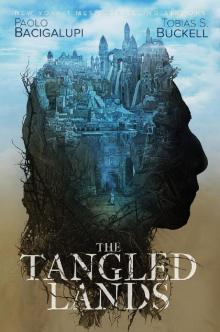 The Tangled Lands
The Tangled Lands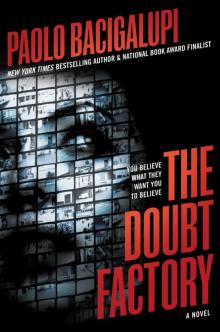 The Doubt Factory
The Doubt Factory Windup Stories
Windup Stories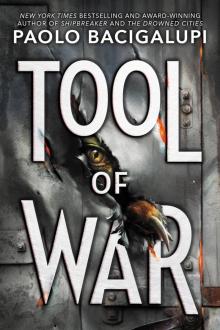 Tool of War
Tool of War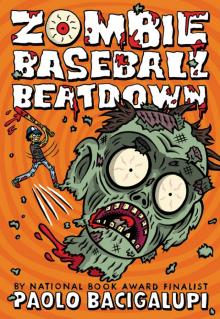 Zombie Baseball Beatdown
Zombie Baseball Beatdown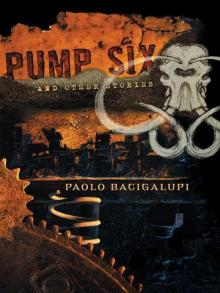 Pump Six and Other Stories
Pump Six and Other Stories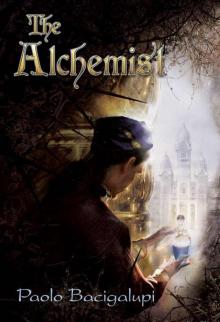 The Alchemist
The Alchemist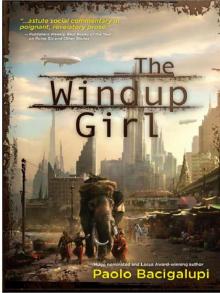 The Windup Girl
The Windup Girl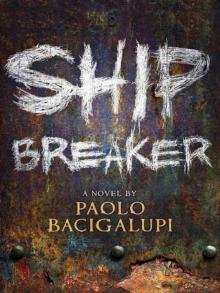 Ship Breaker
Ship Breaker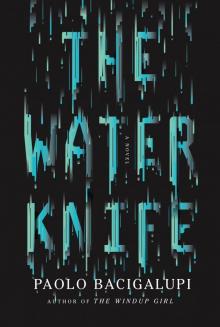 The Water Knife
The Water Knife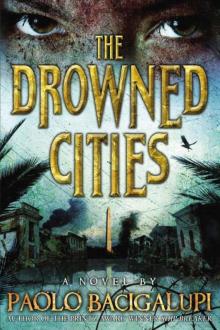 The Drowned Cities sb-2
The Drowned Cities sb-2